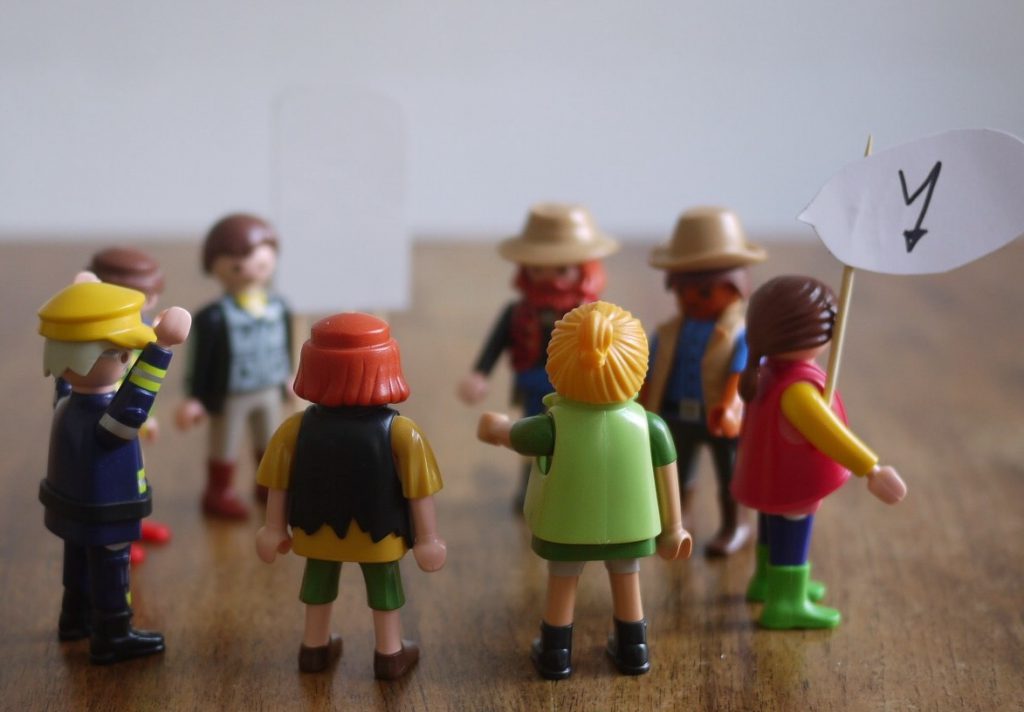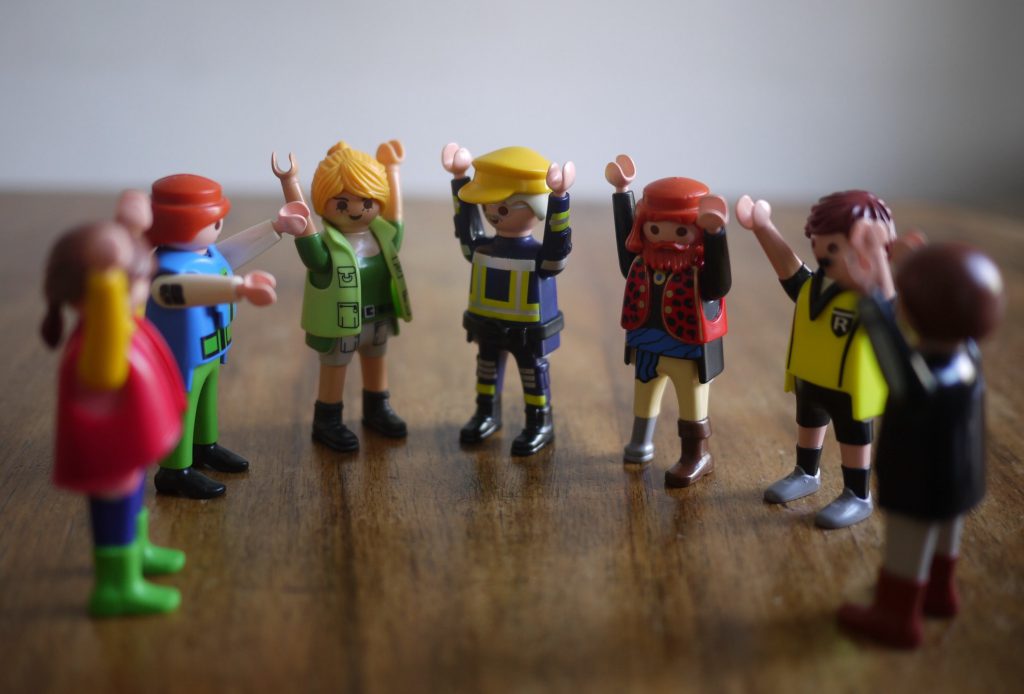Different group phases
In today’s post we discuss the topic of group phases and look at how they can be identified in practice.
Fortunately, our case group has recently dealt with the topic. So we again take the opportunity to look over the shoulders of our protagonists – Maria, Yasemine, Rudi, Beate and Paul – and hear what they have to say about the topic. This time it was not so easy, as our case group did not meet in the back room of the pub of their choice, but – bingo – online…
„Hello, can you hear me?“ Beate understands as she tries to read Rudi’s lips. Apparently his microphone is not working or it is not switched on. Paul has already noticed this too and alerted Rudi via chat that he is seen but not heard. „Good evening, Beate! Punctual as always!“ says Paul and immediately falls silent again. Beate, who after a few weeks of experience in video telephony (including technical challenges) is well practised in „non-verbal“ communication, overhears Paul asking his children to leave him alone and to leave his study – formerly known as the passage or laundry room.
Beate grins and is pleased that Yasemine and Maria have now also entered the virtual room. More greetings follow, Paul’s microphone is on again and Rudi has also managed to change the settings on his laptop and make himself heard: „Good evening, how are you, can you hear me well?“ A multi-voiced yes rings out and thumbs up can be seen. It only takes a few minutes for our five to agree on a few rules for their online meeting and then they are off and running with a round of their feelings, as they always do at the beginning of their biweekly meetings.
Their own experiences as a starting point
Through the initial difficulties during their first virtual meeting, Paul remembers their very first face-to-face meeting: „Do you remember? At the seminar weekend where we met? There was quite a bit of bickering!„. „I must have been in the toilet or on a smoke break,“ Maria replies. But Paul disagrees: „No, no, I know for a fact that you were there too. Yasemine, you said something about the way another participant gives feedback. I don’t remember exactly. In any case, the atmosphere was suddenly different. I thought there was about to be a fight!„
Maria remembers: „Oh, that’s what you mean. Yes, I was there. But I think it’s quite normal and not unusual. We, the whole group, didn’t know exactly how to behave with each other at that time. There was no group culture or agreed rules yet.“ Now Rudi adds: „Well, I also thought it was dreadful and also very brave of Yasemine to say that something was bothering her.“
One situation, different experiences
Additional memories are exchanged, different images emerge of one and the same situation. But the fact that perception is not one-to-one is nothing new for the five colleagues. Paul admits that working with groups is quite challenging for him: „You already know me a little and know that I like it very harmonious. That’s not always easy when you work a lot with and in groups. As a training coach, I am also always confronted with this group dynamic. It helps me to keep reminding myself that there are certain dynamics and phases in groups and that they are needed for a group to develop further or to be able to work in the first place.“
Rudi replies: „Yes, of course. But I notice that I also lose sight of this fact again and again and then ask myself a little helplessly what is going on when some things don’t work or I can’t categorise the mood in the group. What do you think about us using the time right now to look together – as you said, Paul – at what the group phases are all about?“ Yasmine is pleased: „Yes, great idea! Group dynamics is one of my favourite topics anyway!“
Group phases according to Tuckman
Together, the group phases are collected and, because it is more descriptive, written down in the chat of the online platform. The group phases they find are:
– forming
– storming
– norming
– performing
Our protagonists refer to the model of Bruce Tuckman, an American psychologist and organisational consultant, who described his observations as team or group phases in the 1960s. Beate, who has not dealt much with the topic so far, would like to have a little more information about group phases, and so additions are made:
- forming: First meeting & getting to know each other.
Dynamics: Uncertainty, lack of clarity, What am I allowed to do? Do I have a place here? - storming: roles and tasks are defined
Dynamics: friction, excitement, disappointment, power struggles, sometimes strong emotions - norming: roles are defined, rules are laid down
dynamics: members become a team, sense of unity - performing: cooperation, goals are achieved
dynamics: ability to work, success - adjourning (later added to the model by Tuckmann): joint reflection and evaluation, disengagement
Dynamics: cooperation is over, team or group dissolves
… not necessarily linear
Yasemin adds: „Beate, it is important to know that these phases are not necessarily linear. It can be that a group is already working well, but then something happens – a change, someone joins the group or leaves, or a special challenge comes up – and the group starts to „storm“ again. Then it needs a norming phase again and as a trainer it would make sense to support such a phase methodically, for example by giving time to get to know each other again or doing a teambuilding exercise and leading a reflection on the topic of cooperation.“
Beate says that this sounds logical, but „first I have to realise that the group is currently in such a phase. Paul replies that experience and routine are needed and that further training in group dynamics (e.g. ÖAGG or ÖGGO) was very helpful for him, as was having the model of group phases present. Yasemin has another tip: „On the REFAK blog of VÖGB & AK there is a group phase table with leadership functions, I think that’s really good too!“
The five decide to meet in a park next time. „Face to face communication is easier,“ says Rudi a bit mischievously. He kept having audio problems during the meeting. The others agree and look forward to meeting face to face again. „Let’s continue where we are right now,“ says Rudi, „what if the leader himself doesn’t like to lead at the moment and is actually afraid of the group or the dynamics in the group?“ A general thumbs-up ends the online meeting. The virtual room is not cosy enough for long chats. For the sake of simplicity, Rudi agrees to prepare the next meeting.
Authors: Gerda Kolb and Irene Zavarsky
Lust auf mehr? Zu allen Beiträgen der Serie kommst du HIER!

Dieses Werk ist lizenziert unter einer Creative Commons Namensnennung-NichtKommerziell-Weitergabe unter gleichen Bedingungen unter gleichen Bedingungen 3.0 Österreich Lizenz.
Volltext der Lizenz




